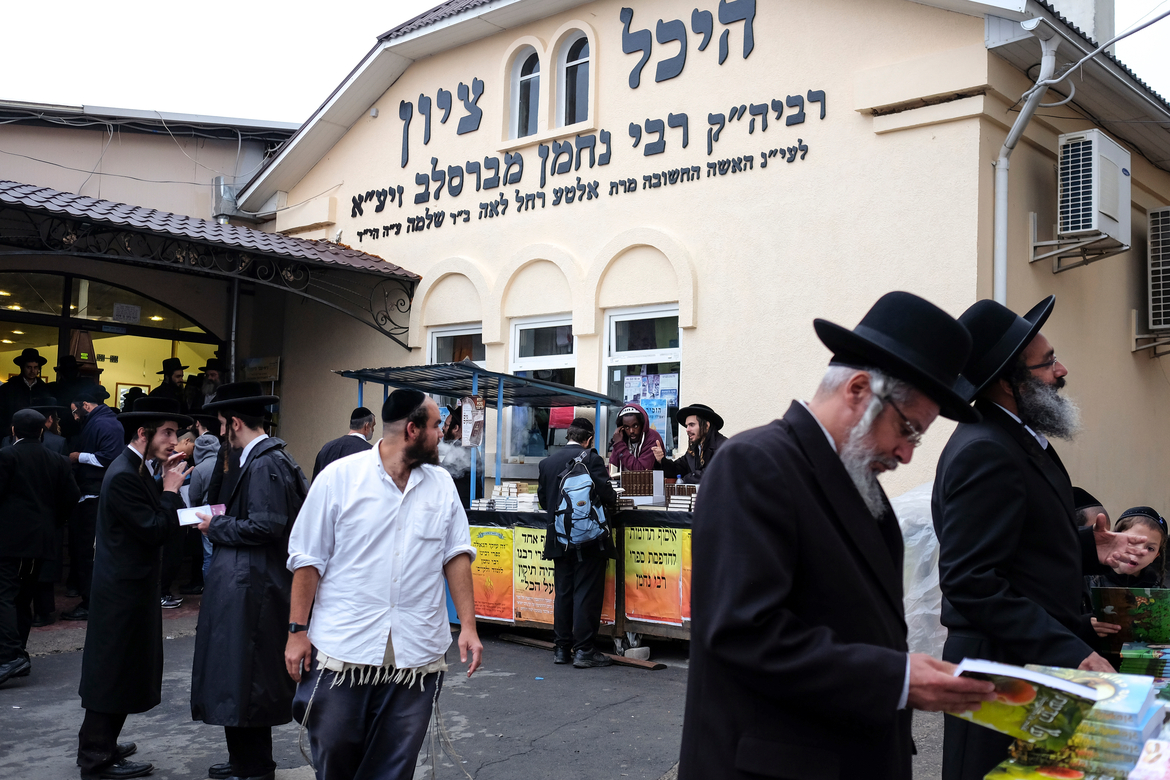Baruch Hashem I am zocheh to be in Uman for Rosh Hashanah this year. I made a number of foiled attempts to get here and in the end I got the invitation from the Rebbe. I’m humbled.
I wanna just write about some of the things I’m feeling now. First of all, there are so many special people who want to be here for Rosh Hashana and haven’t made it here yet. So many chassidim, who are much more devoted to Hashem than I am, aren’t here, yet I am. It makes me feel unworthy. Secondly, I feel a strong responsibility to pray for the miraculous opening of the borders, so that my brothers can enter in peace and reach the holy Rebbe in time for the holiday. Literally tens of friends and family (and friend’s friends) have already contacted me to pray for them by the Rebbe. I need to be a messenger of their prayers. I need to mention them. I need to feel their pain and desperation and bring their daas to Hashem at the holy grave of the tzaddik. Maybe I should say tehillim all day? Maybe I should say a Tikkun Haklali for each one of them? What should I learn for the next 10 days in preparation for Rosh Hashana? I never imagined I would ever have 12 days alone before Rosh Hashana in Uman to devote to teshuva. How do I maximize it? Is an hour a day of hisbodedus enough now, or should I push myself to do more? Should I get up for Tikkun Chatzos and daven with sunrise?
Not to mention that my supportive, giving wife is home alone with the children for these 12 days in Ramat Beit Shemesh under lockdown with a city-wide curfew and 100 degree weather. I feel so bad to have left her and I want to support her in any way I can. My kids need me too, each one in their own way.
So obviously all these feelings are paralyzing me. What do I do?
Reb Nosson writes (Likutei Eitzos (T’mimus 4) based on Tinyana 44) that “we shouldn’t examine our avodas Hashem too much and take on stringencies. Because all that analyzation comes from the yetzer hara, who is trying to confuse us and give us illusions [and expectations of ourselves] to prevent us for serving Hashem. As the Talmud says, “Hashem doesn’t deal imperiously with his subjects.”[He’s isn’t overbearing], and “Hashem didn’t give the Torah to the ministering angels”. All this sophistication, of over-thinking our avodas Hashem, which is called in yiddish ‘Ibber Trachtin’, only takes us away from serving Hashem. The greatest of all insights is not to be a chacham (sophisticate) at all. Just to serve Hashem simply and strait-forwardly.“
“כְּבָר מְבֹאָר, שֶׁעִקַּר הָעֲבוֹדָה הוּא תְּמִימוּת וּפְשִׁיטוּת בְּלִי חָכְמוֹת. גַּם אֵין צְרִיכִין לַחֲקֹר הַרְבֵּה בַּעֲבוֹדָתוֹ וְלִרְדֹּף אַחַר חֻמְרוֹת יְתֵרוֹת. כִּי כָּל זֶה הֵם בִּלְבּוּלִים וְדִמְיוֹנוֹת מֵהַבַּעַל דָּבָר לְבַטְּלוֹ מֵעֲבוֹדָתוֹ, וְאֵין הַקָּדוֹשׁ בָּרוּךְ הוּא בָּא בִּטְרוּנְיָא עִם בְּרִיּוֹתָיו וְכוּ’, וּכְמוֹ שֶׁאָמְרוּ רַבּוֹתֵינוּ זִכְרוֹנָם לִבְרָכָה, לֹא נִתְּנָה תּוֹרָה לְמַלְאֲכֵי הַשָּׁרֵת. וְכָל אֵלּוּ הַחָכְמוֹת, דְּהַיְנוּ מַה שֶּׁחוֹשְׁבִין יוֹתֵר מִדַּי בַּעֲבוֹדָתוֹ [שֶׁקּוֹרִין אִיבֶּער טְרַאכְטִין], הֵם מַפִּילִין אֶת הָאָדָם מֵעֲבוֹדָתוֹ יִתְבָּרַךְ. וְהַחָכְמָה הַגְּדוֹלָה שֶׁבְּכָל הַחָכְמוֹת לִבְלִי לִהְיוֹת חָכָם כְּלָל רַק לִהְיוֹת תָּם וְיָשָׁר בִּפְשִׁיטוּת”
This helps me so much, so often. Just serve Hashem simply. Don’t try to have the best shmoneh esrei, just daven shmoneh esrei. Don’t try to say all of tehillim, just say tehillim. Don’t try to cry. Just open your heart and your mind to the simple words, to the needs of our people. Don’t try to be the messenger. Be the messenger.
Maybe this is what the Rebbe meant in Sichos Haran #305?
“Many times, the Rebbe said, “Me hat gar nit tzu tahn – We have nothing at all to do.”
The Rebbe said this in relation to his conversations [and many of them have already been printed]. We find in the Talmud that the disciples of Rabbi Ishmael taught, “The words of the Torah should not be viewed as an obligation, but one is not permitted to exempt himself from them” (Menachot 99b). This explains the Rebbe’s statement and is wonderful advice to he who understands it even a little”.
We have nothing at all to do, but we can’t not do. What does that mean? Maybe it means that the way to serve Hashem is with the feeling of “I have nothing at all to do”? Remove the pressure. Just go with simplicity.
published on TikkunHaklali.net.

